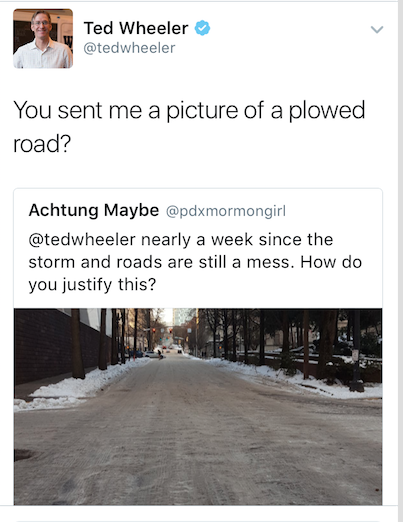FOR PORTLAND’S brand new mayor, the tests have come early and often.
No sooner had Ted Wheeler assumed office on January 1 than the city saw the first of at least four deaths on the streets this year due to the winter’s relentless frigidity.
The mayor capably parried, opening up the Portland Building as a warming shelter for the first time in the city’s history.
Then the snows came. Wheeler’s not the city’s transportation commissioner, but when something snarls the roads—say, layers of ice that leave them hazardous and deeply unpleasant for a week—it’s often the mayor whom citizens will take to task (there’s a reason Charlie Hales didn’t run again, you know).
Wheeler appears to be feeling that pressure. When a citizen angrily tweeted the mayor a recent photo of a downtown road covered in pockmarked ice, someone behind Wheeler’s account tweeted back: “You sent me a picture of a plowed road?”

Winters come and go. But in Portland, protest is everlasting. That’s why this Friday will be the most telling test of Wheeler’s first three weeks. When Donald Trump is inaugurated on January 20, hundreds or thousands plan to demonstrate, as they did after Trump won in November. And like Hales before him, Wheeler’s handling of those protests will force the mayor to walk an almost impossibly fine line that’s probably more typical of his job than anything he’s yet experienced.
No one wants a homeless person to die in the cold, after all, but marches like those planned against Trump provide no easy options. On one side, Wheeler has workers who’ll take umbrage if their commute is stretched by bridge shutdowns. On the other sits a vocal segment of organizers who’ll decry any response they see as a heavy-handed attempt to shut down their freedom of expression.
So I asked Wheeler’s office what the plan was. Spokesperson Michael Cox answered my list of questions with a statement of vague optimism.
“The freedom of speech and the right to assembly are bedrock values we hold dear,” he wrote. “But we should not and cannot abide violence or vandalism. We are confident that Portland will come together around these shared values.”
Where the confidence comes from, I’m not sure. Cox’s statement, after all, is not so different from Hales’ shortly before a notably hands-off police presence at a November 10 anti-Trump demonstration led to rioting.
The pledge not to “abide” vandalism is a hint that Wheeler, who’s been strategizing with police command staff, won’t take such a laid-back stance (Hales promptly cracked down after the riots). But if he’s too quick to deploy crowd-control police—the most reliable tactic I’ve seen to whip up a group of demonstrators—he’ll see himself quickly accused of thuggery. Honeymoon over.
None of this is easy, but in my years of covering protests in this town, it’s often seemed to me that a lesser police presence often produces better results than leading with the riot squad.
Is that Wheeler’s take, too? We’ll find out soon enough.


















